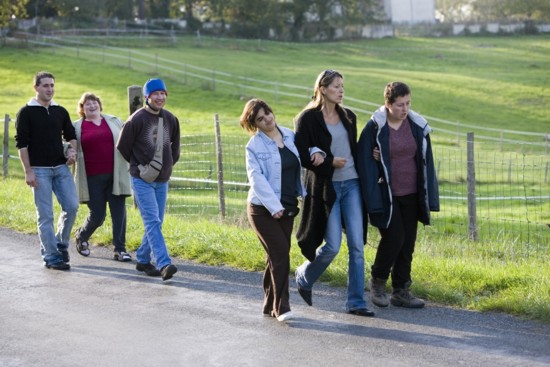|
|
|
|
Written & Directed by Sandrine Bonnaire
Produced by Thomas Schmitt
Director of Photography, Bonnaire & Catherine Cabrol
Edited by Svetlana Vaynblat
Music by Nicola Piovanni, Jefferson Lembeye, & Walter N'Guyen
Released by Film Movement
French with English subtitles
France. 85 mins. Not Rated
Sparked in part by Michael Moore’s widely popular documentary Sicko, health care systems in countries like Canada, England, and France have been given a sort of knight-in-shining-armor insignia in America. As far as I know, there has been little evidence to dispute such a reputation, but French actress Sandrine Bonnaire’s candid documentary of her younger sister’s struggles with autism challenges such perfection.
Not able to handle a "normal" junior high school with her sisters and brother because of her self-destructive behavior, Sabine Bonnaire was expelled and never went back to school, her mental illness misdiagnosed until much later in life. She lived at home until the age of 27, and during this time she could read and write, knit sweaters, and make rag dolls. She studied English and geography, and could play Schubert on the piano. Home movies from this period of a charming and vivacious young girl are a jarring contrast to footage of Sabine now – 38 years old, overweight, sluggish, with mild bouts of violence and a fear of abandonment.
After the death of her brother, her mother took her from Paris to live in the country, separating her from her sisters. Sabine became violent towards her mother, and was eventually put into various psychiatric institutions for five years. When she came out, her capacities were greatly diminished, and many of the old traces of Sabine were gone. Now she can no longer wash herself, she drools and speaks slowly, hits and bites, and keeps the things she loves (mostly her dolls and other gifts) in a locked chest for fear of putting them in the toilet. She lives in a group home with a half-a-dozen housemates with various forms of autism where, at any moment, the calm may be shattered by antisocial or violent behavior. As captured by Bonnaire’s unsparing day-to-day coverage, the caregivers all seem to have the patience of Job.
Recognized as an important piece of work at various film festivals, Sandrine Bonnaire’s sensitive and loving portrait of Sabine illustrates a sad and
honest critique of treatments for mental illness. As Bonnaire herself states, five years in a hospital will make anyone
crazy, and, as was the case with Sabine, institution life can do more harm than good. This film is Bonnaire’s personal plea for a new direction.
B. Bastron
April 15, 2008


